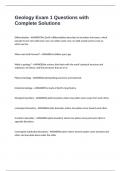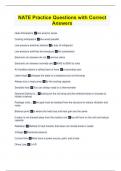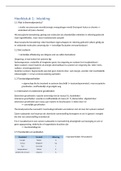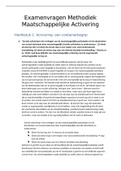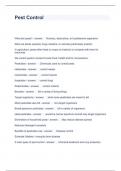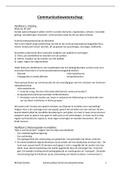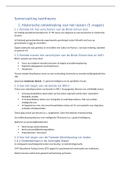Acquired values: what is of high value to a state, nation, group or individual
Harm: as a result of actors (security threats) and/or circumstance (safety dangers)
Protection: (political) priority, means, organization, attention...
Power politics=
Protective state = a western oriented perspective. The state is always the vessel for protection from
external threats through order and law.
National security = it’s about the survival of the state, the oldest idea of security
Population security= the state is taking into account the need of selfish solution, the state need the
population to be functional state become an organization
System security= increasing seeing states organizing physical infrastructures ot organize and make the
state function dependency and vulnerability added
Global public goods= international good that global in reach and scale for instance peace, goods that
everyone make use of. Global interests have to be served at the national level u always the ultimate
authority where the state is the last resource and at the international level all states are theoretically
equal to eachother and there is no higher authority. Benefit a large international public (nonrival and non-
exclusive) - Benefits must be quasi universal in terms of countries, people and generations
Global public bads= problems shared at a global level environment degradation
Pure public goods= Pure public goods: are non-rivalrous in consumption and non-excludable. A pure global
public good is markeclid by universality— that is, it benefits all countries, people and generations.
Intermediate public goods = goods that only partly meet either or both of the criteria. An impure global
public good would tend towards universality in that it would benefit more than one group of countries, and
would not discriminate against any population segment or set of generations
Club goods non rivalrous in consumption but excludable
Common pool resources mostly non excludable but rivalrous in consumption
Imperfect public goods= vehicle to achieve certain things is through intermediary…
Supply problems and collective action problems
Free rider problem: why contribute if its non-excludable
Tragedy of the commons: why limit yourself if you are not sure others will
Prisoners’ dilemma : lack of information leads to a collective suboptimal outcome
LECTURE 2 DEFINITIONS
Divine rules = before the nation state, the state was controlled by the ruler who happened to have his
powers be given by a divine figure (god ). The hierarchy saw the the emperor and the pope as the two
wordily power. Religious interests are mixed with geopolitical interests (papal states- crusades)
Sovereign state= absolute sovereignty as an answer 2 anarchy and as a tool for order. It started linking
individual security to collective security
o Order= foundation of the state
1. "Covenants without swords are but words, secure to no man at all." HOWEVER, if ruler turns to tyranny
citizens have a right to revolt. Aftermath of 30 yrs of war ( Protestantism vs catholicisim)
Leviathan- Hobbes = written against the background of the English Civil War. He said we need to do
something about this brutality (the state of anarchy), and what we need is a new contract between the
people and the sovereign: monarch will get absolute power
but he needs to guarantee peace and security.If the sovereign resigned in tyranny, you are all back to
point zero. “war of all against all”
, Raison d’etat – Ernest Renan(1882) = “avoir fait de grandes choses ensemble, vouloir en faire encore”,
the nation is a people hwo have done great things together and want to make more greamt things
together. From Cardinal de Richelieu, the state interests prevail over religious interests and both
spheres need to be separated from eachother
Bendict Anderson (1983) = an imagined political community, and imagined as both inherently limited
and sovereign
Peace of Westphalia = codifies non-interference in religious affairs of others
State versus church = the case of Charlemaagne vs Napoleon
o Charlemagne vs. Napoleon
Charlemagne goes to Rome and Leo III coronates him Napoleon makes Pious VII go to
Paris and crowns himself in front of him. Napoleon crowed himself
Nation states: Nation is about the people. But the people were not always in one
nation. American revolution, French revolution. "Class" is whipped out.
Revolution creates citizens (bcs before they were subjects.)
Political legitimacy= because of the connection between state and people,
people must feel the sstate is legitimate.
Nation state = the rise of nationalism brought inclusion and exclusion (nationality law)
o Social cohesion= becomes state interests as people need to feel as if they belong to a nation.
Nation becomes a referent object
French revolution= clash of people and nobility. There was a disconnect between nation and state
I am the state we the people= redefinition of the relationship between individual and collective
security. Political legitimacy + social cohesion become state interests. The nation becomes a referent
object
o Inclusion & exclusion= thinkn about who belongs is inclusive, thinking about who belongs is also
exclusive
Rise of collective interests= multipolarity bipolarity multipolarity
o Multipolarity during colonialism era, there were multiple powers governing over the world
for instance UK, France, Spain and others. It was a multipolar world
o Bipolarity after the 2 ww, powers became almost divided. US took under his wing western
countries while Russia all eastern countries
o Multipolarity after the cold war though, the system became once again multipolar, in a sense
that new emerging countries are rising up to the global level,, for instance India or China.
State evolution
o From the church interests to the ruler’s interests, from the ruler’s interests ot the state’s
interest, fro the ruler’s interest to the people’s interests, from raison d’ètat to national interests
Balance of threat = states act to balance the greatest threat against their security, neeed to take into
account aggregate power, geographic proximity, offensive capabilities, offensive intentions
o Offensive intentions can u summarize what intentions are? If u see in what people are
talking about it is a different threat than when you cannot see it
China (Xijinping 2012)= the case of the artificial island made by china (geopolitical conflict , shangai
cooperation organization, belt and road initiative, technology and innovation (rewatch)
, Case: the rise of China
- Xi Jinping came to power in 2012
- The Chinese army is explicitly stated to be the Armed Wing of the Communist party
- How did Xi Jinping come to power?
o Soft power
o Hard power: anti-corruption campaign to take out all his competitors
o Resources: distributed big amounts of money to his party and the rest of the
country
o Network with the “Prince Links” famous communists in 1940s
Sphere of influence
- Artificial islands in the South China Sea -> called Spratly Islands
- Those who oppose him say it’s for military purposes and a military outpost out at sea
- China calls it “an area of special interest”
- It’s a very strategic body of water because of oil resources under the water and major
communication cables
- It is hard to escape the territory by sea because of the high number of islands
surrounding it
- Shanghai Corporation Organisation (SCO) in 2015 included leaders such as Putin, Xi
Jinping and Modi, signals where the heavy weight is
- China and India’s relations are getting worse
- This organisation gives China political legitimacy
Belt and Round initiative
- 21st century silk road
- China is carrying out or planning construction in more than 60 countries along these
routes
- Economic infrastructure for Chinese companies
- Political component to develop footholds closer to the West
- The CCP is not used to hearing ‘no’ a lot
- China claims that it wants to be responsible on the global stage, but they don’t know
how to do it yet
- Development aid
- China “gifted” the African Union a HQ building and then allegedly bugged it for state
secrets
- For certain regimes, it is better to cooperate with China instead of the West because
there is less agenda setting problems
- Technology and innovation
- Huawei: 5G technology, backbone of telephone development, espionage
- 5G is like a soft structural power

